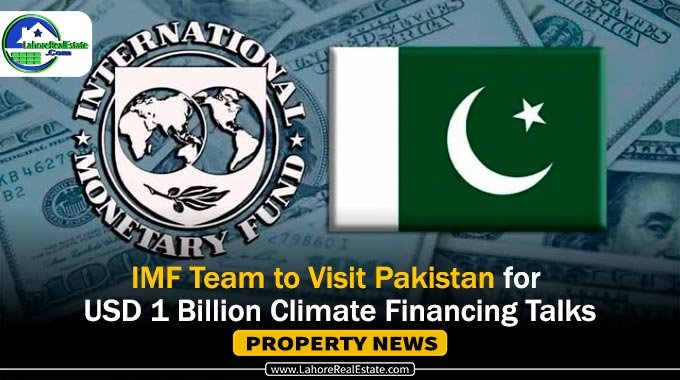The IMF team will visit Pakistan for US $ 1 billion to financing 1 billion climate
Introduction Pakistan is ready to welcome International Monetary Fund (IMF) Next week Mission 1 Billion US Climate Financing Package Talks. This funding is a part of the IMF’s flexibility and sustainability Trust (RST), a global move to tackle the challenges of climate change in 2022 and to help countries in transfer to clean energy.
Since climate change is continuing to threaten Pakistan’s economic and social stability, the purpose of this financing is to promote the country’s flexibility against environmental threats. The visit is also with an important phase of Pakistan’s ongoing economic stability efforts.
Visit and goals of the IMF Mission
According to Khurram Shehzad, Advisor to the Finance Minister of Pakistan, the IMF delegation will be held in Islamabad from February 24 to 28. The main agenda of this visit is to review and discuss climate flexible funding.
The proposed 1 billion US package comes under the Flexibility and Stability Trust (RST), a special IMF program aimed at providing long -term privileged funds to weak economies. Pakistan formally applied for the funding in October 2023, which acknowledged its need to tackle the challenges affected by climate change.
Pakistan’s climate danger
Pakistan is one of the most climate -affected countries globally. In recent years, the country has witnessed high weather patterns, including destructive floods, heatwaves and water shortages. Destructive 2022 was a perfect reminder of the flood Pakistan’s weaknessAffecting more than 33 million people and causing more than 1,700 deaths. Infrastructure, agriculture and livelihood damage left the country in deep economic problems.
With climate support, Pakistan’s purpose is to strengthen its infrastructure, develop an early warning system, and invest in sustainable energy projects that will help reduce the effects of climate disasters.
Flexibility and Stability Trust (RST): What does this mean for Pakistan
The IMF’s first program is designed to provide financial support to countries struggling with long -term economic stability due to climate change. Under this program, funding comes with low interest rates and extension payment terms, which makes it a viable option for Pakistan.
Pakistan’s goals with first funding include:
- Strengthen the procedure of destruction response
- Increase the management of water resources
- Increase renewable energy projects
- Implementation of climate-smart agriculture
- Reducing carbon emissions by policy reform
Pakistan’s broader economic challenges
While the IMF delegation has focused on climate financing, another The IMF team will visit Pakistan in early March for the first review of the $ 7 billion expansion fund facility (EFF) in early March. The purpose of this economic bailout package earned last year is to strengthen Pakistan’s critical economy, which is suffering from inflation, financial losses and a growing crisis of debt.
Pakistan’s economic recovery is uncertain due to numerous challenges, including:
- GDP ratio from high debt
- Limited reserves of foreign exchange
- Energy shortage
- Political instability
Successful negotiations on climate support will provide a lot of assistance, which will help Pakistan reduce environmental risks while eliminating its economic risks.
Importance of climate financing for the future of Pakistan
Climate change is no longer just an environmental problem – it is economic. Repeatedly causes billions of damages to suffer, Pakistan cannot afford to ignore its climate risks. In privileged financing, it would be an important step to gain resilience of US $ 1 billion, reduce economic shocks and ensure the sustainable future of its citizens.
The IMF’s first program offers an opportunity for Pakistan to integrate climate adaptation into its broader economic strategy. However, effective use of these funds, transparency and implementation of policy will be key to ensuring long -term benefits.
Conclusion
Since Pakistan is preparing to host the IMF delegation for climate -financing debates, the country stands at a critical juncture. The results of these talks will determine that Pakistan can benefit from international assistance in dealing with climate risks and transferring sustainable, low -carbon economy.
Despite promoting climate threats and economic uncertainty, obtaining this US $ 1 billion package will not only strengthen Pakistan’s environmental flexibility but also help in long -term financial stability. Policy makers have to ensure that this funding has been directed to effective projects that benefit the most weaker population and protect Pakistan’s future against climate -affected disasters.




